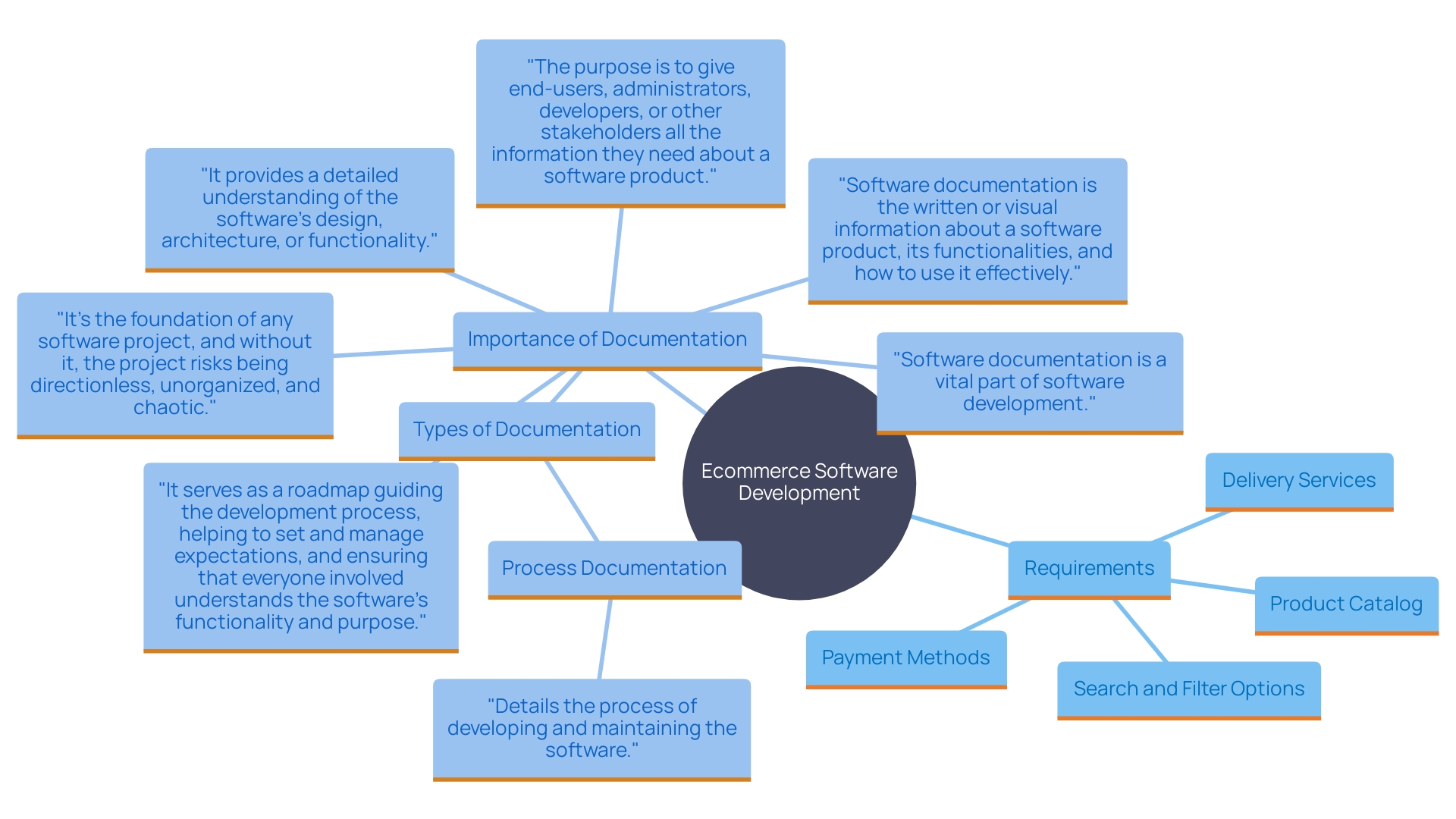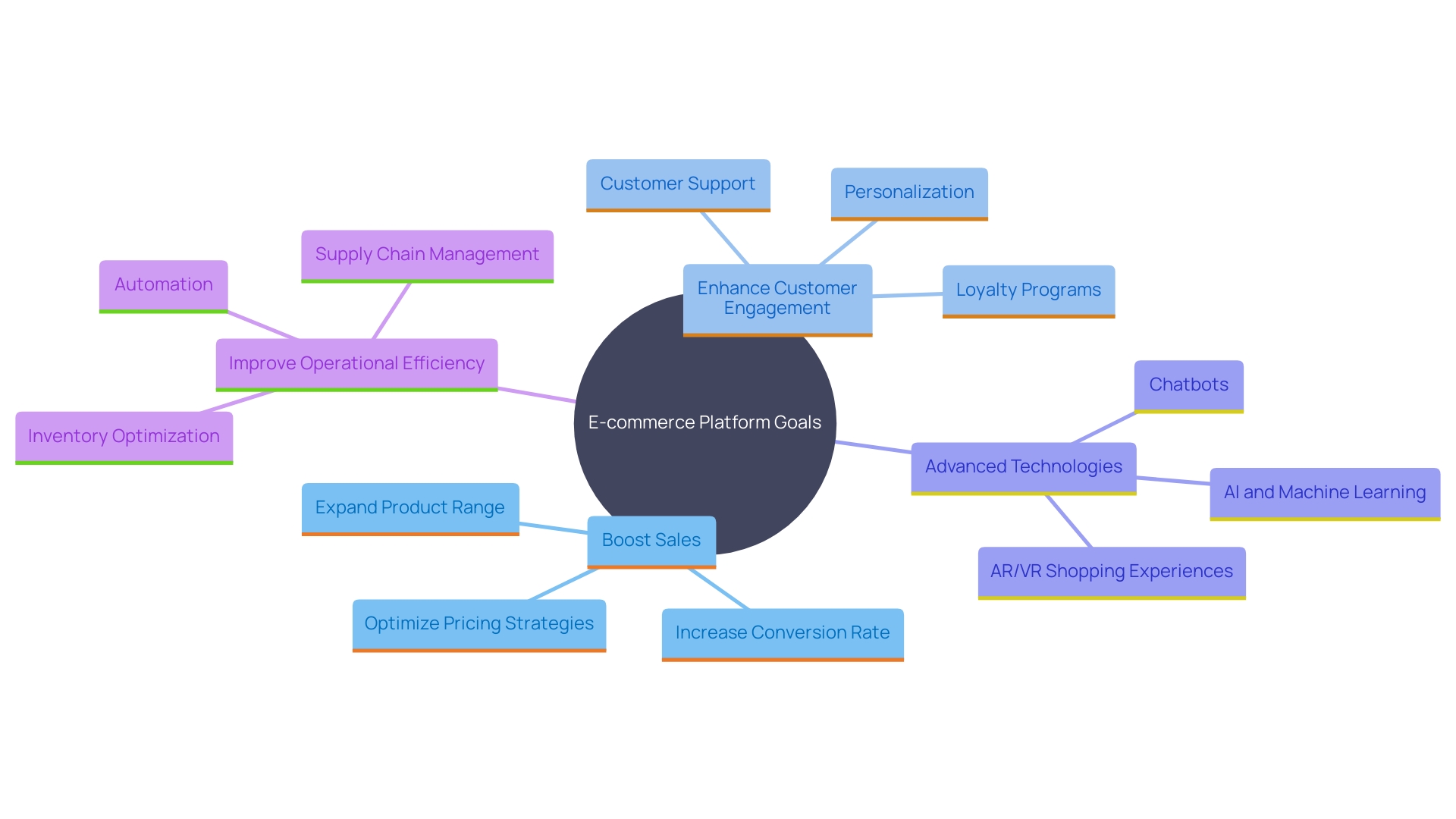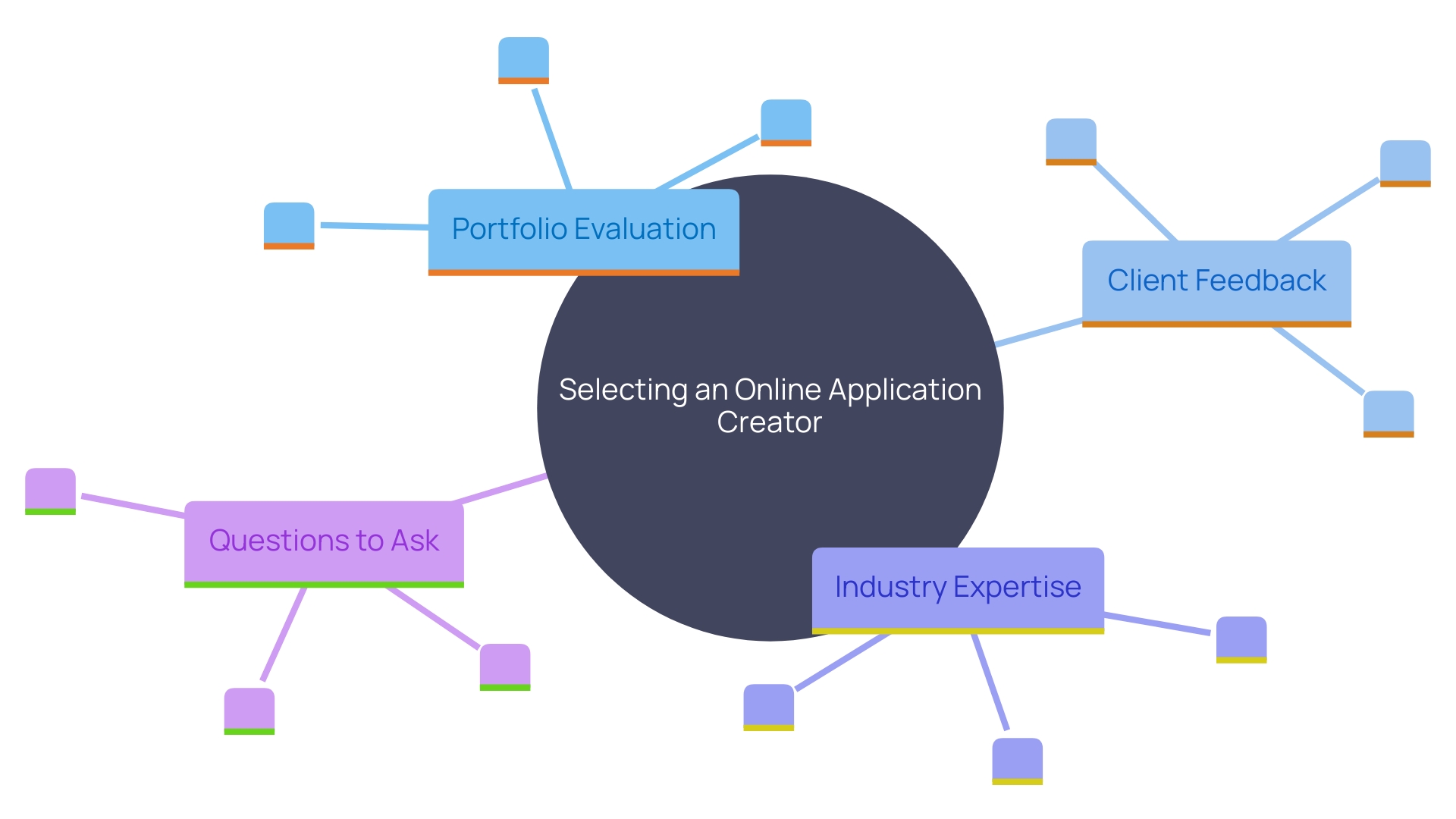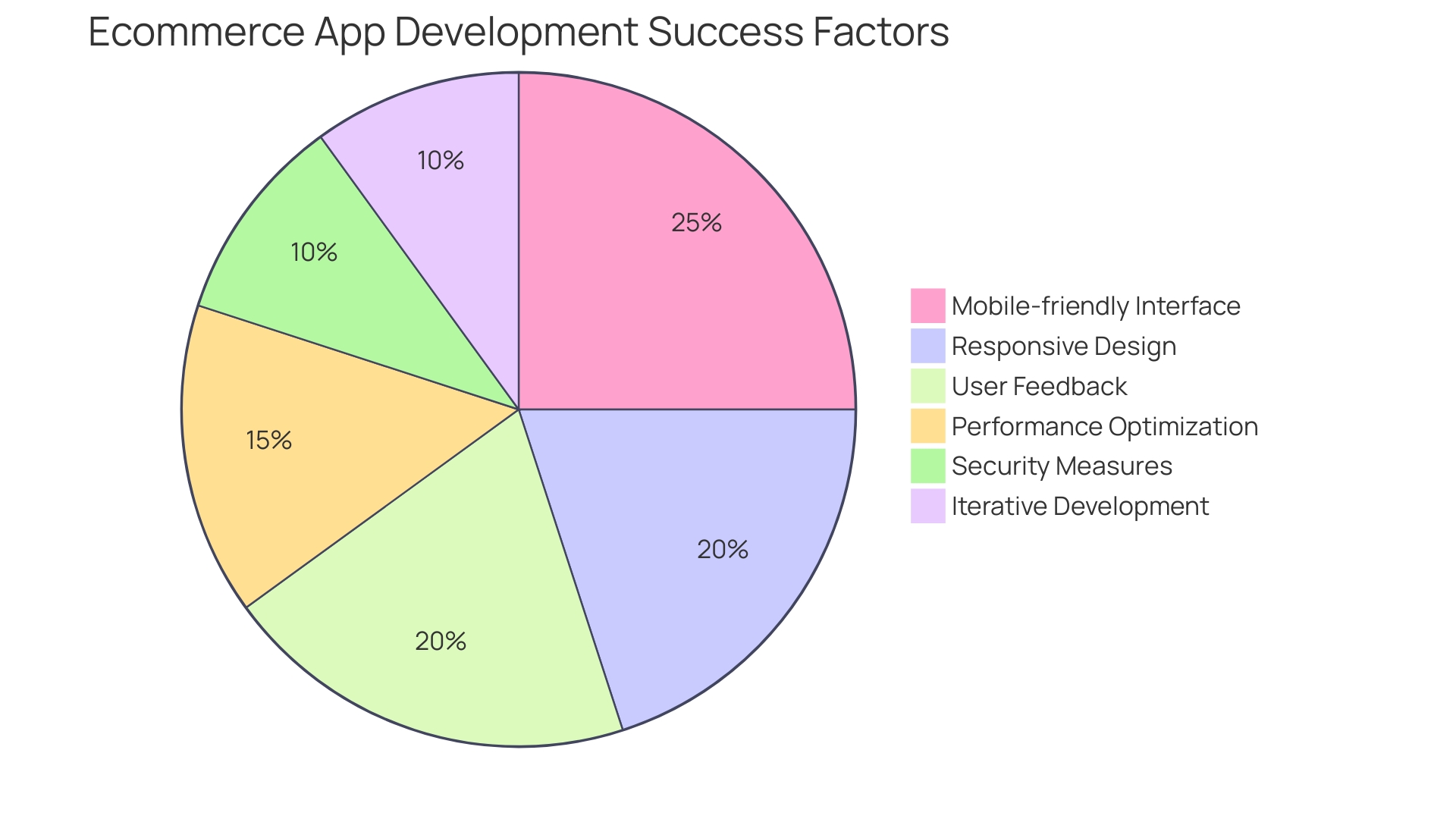Introduction
In the rapidly evolving landscape of digital commerce, the success of an ecommerce application hinges on meticulous planning, clear objectives, and strategic partnerships. The journey begins with a comprehensive understanding of the specific needs, encompassing functionality, user experience, and system integrations. This foundational step ensures that the vision for the app is communicated effectively to potential developers, paving the way for a smooth development process.
Setting clear goals and measurable objectives is equally critical, as these guide the development team and align their efforts with the overarching business aims. Advanced technologies, such as generative AI, can play a pivotal role in enhancing customer engagement and operational efficiency, underscoring the importance of well-defined technical requirements.
Choosing the right development partner involves a thorough evaluation of their portfolio, client testimonials, and industry experience. Detailed inquiries into their project management approach, technological expertise, and quality assurance processes are essential to ensure a successful collaboration.
Adhering to best practices in ecommerce app development, such as prioritizing responsive design, performance optimization, and robust security measures, is crucial. Continuous improvement through iterative development and user feedback can significantly enhance the user experience, ultimately driving higher conversion rates and customer loyalty.
Understanding Your Ecommerce App Needs
Before beginning the search for ecommerce software developers, it's essential to clearly define your requirements. This involves detailing the functionalities you need, the user experience you envision, and any necessary integrations with your existing systems. For instance, considering the case of an online vegetable and fruit selling platform, you would need features like a product catalog, search and filter options, delivery services, and various payment methods. Documenting these requirements meticulously will guide your discussions with potential creators and ensure they grasp your vision clearly. As one expert noted, 'A requirement is a statement that identifies a product or process operational, functional or design constraint or characteristic, which is unambiguous, testable, measurable and necessary for the acceptance of the product or process.' This clarity can prevent misunderstandings and ensure a smooth development process.

Defining Your App Goals and Objectives
Establishing clear goals and objectives for your e-commerce platform is crucial for its success. Whether your aim is to boost sales, enhance customer engagement, or improve operational efficiency, setting measurable objectives is key. These goals offer a roadmap that directs creators, ensuring they comprehend and align with your vision. As Forrester Research highlights, the adoption of advanced technologies like generative AI can significantly enhance customer engagement by improving brand knowledge and memory. Moreover, understanding the technical requirements and features needed, such as integrating reliable and efficient software like Ext JS, can lead to a high-quality product that performs consistently under specified conditions. By clearly conveying these goals, creators can better adapt their efforts to fulfill your particular requirements, leading to a more efficient and user-friendly online shopping platform.

Evaluating Development Companies: Criteria and Questions
When assessing possible online application creators, it's essential to take into account various important factors to guarantee you choose the appropriate collaborator for your project. Start by examining their portfolio to understand the complexity, scale, and technologies used in their past projects. For example, companies like Nets, which have been providing digital payment solutions for over 50 years, showcase a robust portfolio tailored to meet various market requirements. This level of expertise can be a strong indicator of a developer's capability to handle intricate e-commerce projects.
Client testimonials are another valuable resource. Request and contact references from previous clients to gain insights into the vendor’s reliability, communication skills, and adherence to timelines and budgets. According to industry experts, assessing the vendor’s background in your specific domain can lead to more effective solutions, especially in industries with unique challenges like healthcare or finance.
Industry experience is also paramount. As digital transformation continues to evolve, having an expert who understands industry-specific trends and challenges can be the difference between success and failure. For instance, the global e-commerce landscape is projected to grow by 64.69% from 2023 to 2027, reaching $6.34 trillion in revenue. This growth highlights the necessity for professionals who are not only technically skilled but also knowledgeable about the latest market trends and consumer behaviors.
Prepare a list of questions to assess their expertise further. Inquire about their approach to project management, the technologies they specialize in, and their quality assurance processes. As highlighted by experts, understanding how a vendor ensures the quality of their work is critical. This includes their methodologies for testing and validating the software to ensure it meets all performance and security standards.
In summary, a thorough assessment of a developer's portfolio, client testimonials, and industry background, combined with detailed inquiries about their processes, can significantly enhance your chances of choosing the right e-commerce application developer for your needs.

Best Practices for Ecommerce App Development
Adhering to best practices in ecommerce app development is vital for success. This includes ensuring responsive design, prioritizing performance optimization, and implementing robust security measures. Considering that more than 50% of individuals will not think about buying from a brand with a badly designed mobile site, emphasizing a mobile-friendly interface is essential. Websites that load in two seconds or less can achieve a 15% higher conversion rate than the average mobile site. Additionally, consider iterative development and user feedback as essential components to refine the app based on real-world usage. Over 90% of B2B purchasers with an enhanced mobile interface will probably make another purchase from the same supplier, emphasizing the significance of ongoing development. A notable example is Ripley, a leading retail company in Chile and Peru, which has successfully enhanced their mobile experience through a user-centric approach, demonstrating the substantial impact of prioritizing user experience in ecommerce development.

Conclusion
Success in e-commerce relies on a clear understanding of application needs. Documenting specific functionalities, user experience, and necessary integrations is crucial for effective communication with developers, helping to prevent misunderstandings and align the final product with the initial vision.
Establishing measurable goals and objectives is equally important, guiding developers and enhancing the application’s effectiveness. Utilizing advanced technologies like generative AI can further boost customer engagement and operational efficiency, highlighting the need for clear strategic communication.
Choosing the right development partner demands careful evaluation. Analyzing a developer's portfolio, client testimonials, and industry experience provides essential insights. Engaging with references and asking targeted questions about project management and quality assurance will inform the selection process.
In a rapidly evolving e-commerce environment, partnering with an experienced developer can be a key differentiator.
Adhering to best practices in e-commerce app development is vital. Focusing on responsive design, performance optimization, and robust security creates an engaging user experience. Continuous improvement through iterative development and user feedback is essential for refining the application and enhancing customer loyalty.
By prioritizing these elements, businesses can exceed customer expectations, driving higher conversion rates and sustained growth in a competitive market.





